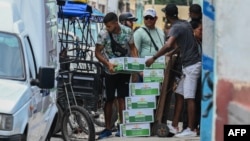Cuba’s centrally planned economy is in terrible shape with high inflation and devastating energy and food shortages. The current crisis is widely seen as the worst since the Communist revolution in Cuba in 1959. At a recent meeting, Cuban leader Miguel Díaz-Canel pleaded with his ministers “to save the revolution and to save socialism.”
But as Deputy Assistant Secretary of State for Western Hemisphere Affairs Eric Jacobstein noted at a recent Congressional hearing, “Communism has failed in Cuba:”
“The Cuban people are eager to control their own economic destiny. Today, more than one third of Cuba’s labor force works in one of the island’s 11,000 plus private businesses.”
“The Cuban people still view the United States as a preferred partner,” said Deputy Assistant Secretary Jacobstein. “We therefore cannot cede space to Russia or China and must continue to foster growth of the private sector:”
“We recognize that this will not turn Cuba into a capitalist democracy overnight. But we believe that Cuba’s dynamic private sector offers ordinary Cubans opportunity for a better life.”
To help promote such an outcome, the United States recently made a series of regulatory changes aimed at supporting Cuba’s private sector entrepreneurs, including by expanding access to U.S. financial services.
U.S. policy also focuses on support for the human rights and fundamental freedoms of the Cuban people, said Deputy Assistant Secretary Jacobstein:
“The Cuban regime holds approximately 1000 unjustly detained political prisoners behind bars. This includes hundreds of peaceful protesters from July 11th, 2021. We continuously push for their unconditional and immediate release through bilateral and multilateral channels.”
Following the July 2021 protests, the United States imposed sanctions under the Global Magnitsky Act on components and personnel of the Cuban military and the Ministry of the Interior responsible for the crackdown on these peaceful protesters. The State Department also imposed visa restrictions on 28 Cuban officials who enabled unjust detentions and sham trials of peaceful protesters, noted Deputy Assistant Secretary Jacobstein.
“Human rights remain our top priority in the bilateral relationship,” he declared.
The United States will continue to stand with the Cuban people and support their demands for human rights, prosperity and a future of greater dignity.






